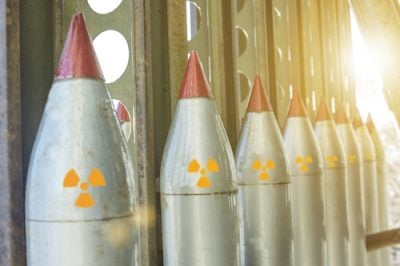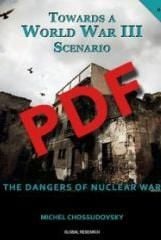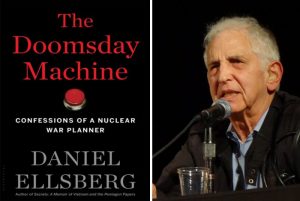Will Humans be the Next ‘Freedom Fries’?

All Global Research articles can be read in 51 languages by activating the “Translate Website” drop down menu on the top banner of our home page (Desktop version).
To receive Global Research’s Daily Newsletter (selected articles), click here.
Visit and follow us on Instagram at @globalresearch_crg and Twitter at @crglobalization. Feel free to repost and share widely Global Research articles.
***
U.S. pundits and strategic experts seem blissfully unaware of how close we all are to being fried in a nuclear strike by Russia. (Fair Labeling: if you are simply looking for yet another reason to demonize Putin, rather than to understand where he is coming from, save time and read no further.)
Here’s the thing: the Russians have good reason to be on hair-trigger alert. Their early-warning radar system is so inadequate that there are situations (including those involving innocent rocket launches) under which Russian President Putin would have only a few minutes – if that – to decide whether or not to launch nuclear missiles to destroy the rest of the world – on the suspicion that Russia was under nuclear attack.
“If that”? Yes, launch-to-target time is now so short that it is altogether likely that the authority to launch nuclear weapons is now vested in subordinate commanders “in the field,” so to speak. Readers of Daniel Ellsberg’s Doomsday Machine are aware of how the US actually devolved this authority during the days of the first cold war. I, for one, was shocked to learn that. Worse: today the subordinate commanders might be non-commissioned computers.
Russia, of course, is not about to admit that its early-warning system is far inferior to the US’s world-wide, satellite-based capability. But such is the case. The implications could not be more serious.
This came to mind today as former Russian President Dmitry Medvedev said the Kremlin would never allow the destruction of Russia. He warned, however, that if Washington did achieve what he described as its destructive aims, the world could face a dystopian crisis that would end in a “big nuclear explosion.”
President Putin addressed this issue four years ago, shortly after unveiling Russia’s new nuclear arsenal, including hypersonic missiles and other highly advanced weapons. Commenting on nuclear war, Putin told an interviewer:
“Certainly, it would be a global disaster for humanity; a disaster for the entire world.” He added that “as a citizen of Russia and the head of the Russian state I must ask myself: Why would we want a world without Russia?”
Use Them or Lose Them
Putin went on to say that, despite the disastrous consequences, Russia would be forced to defend itself using all available means, if its very existence were put at stake:
“A decision on the use of nuclear weapons may only be taken if our ballistic missile attack warning system not only detects a launch, but also predicts that the warheads would hit Russian territory. This is called a retaliation strike.”
That’s the rub. Some radar “detects” and “predicts,” and we’re all toast – or freedom fries. While Russia now has in its operation inventory sophisticated weaponry that can defeat any traditional Anti-Ballistic Missile (ABM) defense, it lags the US in the capability for early warning.
Think about it. Which should you fear more: getting fried on purpose, or getting fried by mistake? Macabre. Are not these choices incredibly stupid for rational human beings? If forced to choose, though, I think I’d resent much more getting fried by “Opps, pardon our mistake”. Please read what follows and ask yourself whether an immediate ceasefire is needed in Ukraine, or whether those who want to risk war with Russia should be given their head.
Russia: Limited Early-Warning Coverage
The US’s satellite “global situational awareness” alert system enables it to detect immediately the launch and location of a ballistic missile anywhere on the planet, including the sea. Russia lacks that worldwide capability. If this technical shortcoming is not taken into account (and there are signs that the Pentagon is paying it no heed), we could all suddenly be very dead – or “mostly dead” (to quote Billy Christal in The Princess Bride). (Ted Postol spelled this out in some detail at a Committee for the Republic virtual salon on March 17.
Postol, a retired MIT professor of physics and senior Pentagon adviser, provided a brief case study, which I summarize below:
On Jan. 25, 1995, Russian generals were focused on a rocket that was launched from Norway and detected by their automatic-alarm radar. Could this be the opening volley of a large-scale nuclear attack including sea-launched ballistic missiles? Given Russia’s inability to detect missile launches from submarines at sea, those generals could not rule out the possibility that Russia was already under attack by nuclear-armed Trident submarines.
A saving grace in 1995 was that those same generals had reliable intelligence that US ICBMs were not about to attack. At least equally important, in 1995 relations between Russia and the US were on a relatively even keel. Now? Not so much.
Postol added the following to indicate Russia’s redoubled concern over its early warning deficiency: the US has now increased the overall killing power of US ballistic missile forces by a factor of between two or three. This is exactly the kind of capability that a nuclear-armed state would build if it wanted to have the capacity to fight and “win” a nuclear war by a disarming first-strike.
The rocket from Norway? Scientists launched it to study the Northern Lights, but apparently no one had thought to tell the Russians.
Aside from asking the Norwegians to forewarn the Russians next time, what else can be done? The Washington can stop making relations still more tense over Ukraine. The Pentagon may boast about its formidable offensive strategic capabilities, but it has no way to protect us from a Russian nuclear attack. And if a false alert occurs a la 1995, this time sans the “saving grace” of a decent bilateral relationship with Russia, we could all end up as human fries. It should give us zero consolation to know that most Russians would too.
*
Note to readers: Please click the share buttons above or below. Follow us on Instagram, @globalresearch_crg and Twitter at @crglobalization. Feel free to repost and share widely Global Research articles.
Ray McGovern works with Tell the Word, a publishing arm of the ecumenical Church of the Saviour in inner-city Washington. His 27-year career as a CIA analyst includes serving as Chief of the Soviet Foreign Policy Branch and preparer/briefer of the President’s Daily Brief. He is co-founder of Veteran Intelligence Professionals for Sanity (VIPS).
 “Towards a World War III Scenario: The Dangers of Nuclear War”
“Towards a World War III Scenario: The Dangers of Nuclear War”
by Michel Chossudovsky
Available to order from Global Research!
ISBN Number: 978-0-9737147-5-3
Year: 2012
Pages: 102
PDF Edition: $6.50 (sent directly to your email account!)
Michel Chossudovsky is Professor of Economics at the University of Ottawa and Director of the Centre for Research on Globalization (CRG), which hosts the critically acclaimed website www.globalresearch.ca . He is a contributor to the Encyclopedia Britannica. His writings have been translated into more than 20 languages.
Reviews
“This book is a ‘must’ resource – a richly documented and systematic diagnosis of the supremely pathological geo-strategic planning of US wars since ‘9-11’ against non-nuclear countries to seize their oil fields and resources under cover of ‘freedom and democracy’.”
–John McMurtry, Professor of Philosophy, Guelph University
“In a world where engineered, pre-emptive, or more fashionably “humanitarian” wars of aggression have become the norm, this challenging book may be our final wake-up call.”
-Denis Halliday, Former Assistant Secretary General of the United Nations
Michel Chossudovsky exposes the insanity of our privatized war machine. Iran is being targeted with nuclear weapons as part of a war agenda built on distortions and lies for the purpose of private profit. The real aims are oil, financial hegemony and global control. The price could be nuclear holocaust. When weapons become the hottest export of the world’s only superpower, and diplomats work as salesmen for the defense industry, the whole world is recklessly endangered. If we must have a military, it belongs entirely in the public sector. No one should profit from mass death and destruction.
–Ellen Brown, author of ‘Web of Debt’ and president of the Public Banking Institute


